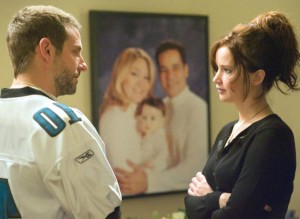by Raj Ranade
There’s a tiny moment in a diner during Silver Linings Playbook that gets at the heart of what makes director David O. Russell’s films so interesting. Pat (Bradley Cooper) and Tiffany (Jennifer Lawrence) are there on a “not a date” date, which is teetering between flirtatiousness and contempt. When Pat goes too far with one comment, Tiffany violently overreacts, screaming and sweeping their dishes right off the table. It’s a jarring, unpleasant moment for the audience, but as Pat chases Tiffany out the door, we hear the diner crowd, in the way of drunken late-night diner crowds, hooting and hollering like they’re watching righteous Jerry Springer-style payback.
It’s only a few seconds on screen, but even in throwaway moments like these, Russell is demonstrating an expansive vision. The people surrounding his leads aren’t just window dressing to support them, but independent, unpredictable presences in their own right. Romantic comedies tend to focus closely on their central couple, but Russell (The Fighter, I Heart Huckabees, Three Kings) has always been too much of an ensemble guy to zero in too narrowly. He’s interested in the way walking bundles of neuroses collide with each other, preferably five or six at a time in one crowded room full of screaming and laughing and fighting.
In fact, Silver Linings Playbook is the rare romantic comedy that’s at its best when it isn’t only our central couple on stage. It’s no fault of Cooper or Lawrence, both of whom are great – it’s a script that’s pretty thoroughly conventional from the get-go, as least as it relates to our leads. To wit, the quick summary: fresh-from-institutionalization Pat wants his bipolar compatriot Tiffany to help him win back his wife, at least until the two bond while practicing for a local dance competition and help each other heal in the process. This all goes where you’d expect, and it all rings a touch phony. Despite a few vivid images of mental distress early on, like when a Stevie Wonder song that triggers troubling memories sends Pat (and the camera) into a frantic rage, the movie’s ultimate portrait of mental illness seems to be as something that can be overcome with a little bit of gumption and the right guy or girl.
But this central fluff is surrounded by so much convincing texture and talented acting that it’s hard not to go along with the whole package. There Pat’s dad (Robert De Niro, better than he’s been in years) as the laid-off worker turned superstitious bookie, eagerly seeking ways to alter the local “juju” in order to help his beloved Philadelphia Eagles to victory. There’s Ronnie (John Ortiz), Pat’s old friend earnestly striving to save his floundering marriage to Tiffany’s sister Veronica (Julia Stiles) through elaborate home improvement projects, hoping that a few extra iPod docks might stave off crushing mundanity. There’s Chris Tucker in his first role in five years, a fellow “inmate” of Pat’s who defies our expectations by being one of the calmest presences in the entire movie, which also might explain why he’s able to escape his institution repeatedly (it’s fun to think of this film’s Tucker as what Rush Hour‘s frantic, flailing Tucker would be like on Zoloft).
And as mentioned, Cooper and Lawrence are great. Cooper’s glassy-eyed intensity strikes a perfect balance between being genuinely unnerving and serving as a hilarious counterpoint to the more stable presences around him. And Lawrence, who made a name for herself playing assured, tough-as-nails women in Winter’s Bone and The Hunger Games, here impresses with her vulnerability and volatility – you forget that steeliness until it suddenly pops up during her climactic skewering of the De Niro character’s superstitions.
There’s a gritty believability to the tangential presences here – the vivid detail in which they’re sketched, the way they reflect social and personal concerns, and the way they share obsessions both positively and negatively. This all butts against the Hollywood-ized charm of the performances and the aww-inducing plot. No doubt the contrast was part of the point – “The world’s hard enough as it is, guys,” Pat declares during an anti-Hemingway rant that could be Russell’s mission statement. “Can’t someone say ‘Hey, let’s be positive. Let’s have a good ending to the story?'” But though there’s nothing wrong with providing escapism during troubled times, it’s unfortunate that doing so required trivializing a serious issue like mental illness. (This, of course, will hardly hurt its Oscar chances. Slumdog Millionaire, which played similarly loose with the issue of poverty but similarly got by on its energy and texture, had no trouble taking home Best Picture a few years ago, although that film was at least more explicit about its status as a fairy tale).
And while Russell is clearly adept at applying new tricks to old tropes, I do wish that he’d head back towards the more idiosyncratic territory of his earlier career. Even The Fighter, which was soaked in boxing movie cliche, had a novel angle about the complicated relationship between boxing and its TV representation, and the film is far removed from the heights of satirical Persian Gulf heist thriller Three Kings and I Heart Huckabees, the comedy about an “existential detective agency”. But if the consolation prize instead of movies like those is warmly funny riffs on Hollywood formula like Playbook, it’ll be hard to complain all that much.









